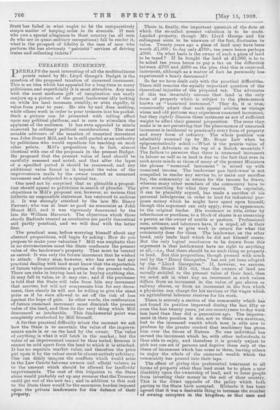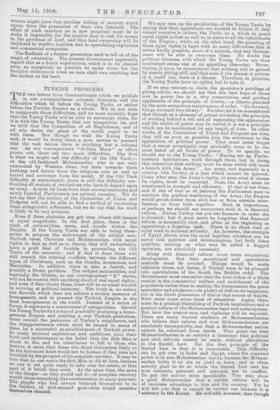UNEARNED INCREMENT.
PERHAPS the most interesting of all the multitudinous point§ raised by Mr. Lloyd George's Budget is the question of the proposed taxation of unearned increment. This is an idea which has appealed for a long time to many politicians, and superficially it is most attractive. Any man with the most mediocre gift of imagination can easily conjure up a picture of the great landowner idly looking on while his land increases steadily, or even rapidly, in value from year to year. He sits by and does nothing, while others work in order to pour treasure into his pocket. Such a picture can be presented with telling effect upon any political platform, and is sure to stimulate the applause of the audience. It has even appealed to minds unmoved by ordinary political considerations. The most notable advocate of the taxation of unearned increment was John Stuart Mill, and he is still quoted as an authority by politicians who would repudiate his teaching on most other points. Mill's proposition is, in fact, almost identical With one of the proposals in the present Budget. He proposed that the present value of land should be carefully assessed and noted, and that after the lapse of a specified period it should be reassessed, and any additional value found in it beyond the value of the improvements made by the owner treated as unearned increment and subjected to a special tax.
One need not be surprised that so plausible a proposi- tion should appeal to politicians in search of plunder. The objections to Mill's proposal are, however, so Serious that hitherto no responsible statesman has ventured to endorse it. It was strongly attacked by the late Mr. Henry Fawcett, who was At least as good an economist as John Stuart Mill, and it was vigorously denounced by the late Sir William Harcourt. The objections which those sturdy Radicals treated as conclusive are partly theoretical and partly practical, and we Will deal with the latter first.
The practical man, before worrying himself about any abstract propositions, will begin by asking: How do you propose to make your valuation ? Mill was emphatic that in no circumstances must the State confiscate the present value of the landowner's property. That must be treated as sacred. It was only the future increment that he wished to attack. Every trian, however, who had ever had any practical dealing with land must know that the expectation of future value constitutes a portion of the present value. There are risks in buying land as in buying anything else. It may fall in value, or it may rise ; and if the purchaser is told that the State will take from hits any increment that accrues, but will not compensate him for any decre- ment, then clearly he will not be willing to give the same price as if he were allowed to set off the risk of loss against the hope of gain. In other words, the confiscation of future unearned increment must diminish the present value of the land, and thus do the very thing which Mill denounced as intolerable. This fundamental point was completely overlooked by Mill himself.
A further practical difficulty arises the moment we ask how the State is to ascertain the value of the improve- ments made in or on the land by the owner. The value of anything is what it will fetch in the market ; but the value of an iinprOvement cannot be thus tested, because it cannot be sold apart from the land to which it hi attached. It has no separate market value, and therefore the price put upon it by the valuer must be almost entirely arbitrary. One can ditnly imagine the conflicts which would arise in the Law Courts between owners :led official valuers as to the amount which should be allowed for landlords' improvements. The cost of this litigation to the State alone would probably eat up any revenue that the Treasury could get out of the new tax ; and in addition to this cost to the State there would be the enormous burden imposed upon the private landowners for the defence of their ptopetty.- There is, finally; the important question of the date at which the so-called present valuation is to be made. Lauded property, though Mr. Lloyd George and his colleagues seem to be unaware of the fact, fluctuates in value. Twenty years ago a piece of land may have been worth £1,000; to-day only £700;.. ten years hence perhaps £800. On what basis is the owner of such a piece of land to be taxed ? If he bought the land at £1,000, is he to be asked ten years hence to pay a tax on the difference between £700 and £800 on the plea that this is unearned. increment, although as a matter of fact he .personally has. experienced a heavy decrement ?
So far we have dealt only with the practical difficulties.
There still remains the equally important question of the theoretical injustice of the proposed tax. The advocates of this tax invariably Resume that land is the only form of property whieli is subject to the phenomenon known as " unearned increment." They do, it is true, occasionally admit that such special articles as vintage wines and old pictures may experience unearned increment, but they rightly dismiss these instances as not of sufficient weight to affect their general proposition. The error they make is in not perceiving that the phenomenon of unearned increment is incidental to practically every form of property and every form of industry. The whole position was admirably summed up by Mr. Bonar Law when he epigrammatically asked :—What is the prairie value of the Lord Advocate on the top of a Scotch mountain ? The failure to perceive that there is unearned increment in labour as well as in land is due to the fact that even in. such acute minds as those of many of the present Ministers the phrase " unearned increment " is mixed up with unearned income. The landowner qua landowner is not compelled to render any service to, or make any sacrifice for, the community in return for the income he draws, whereas many other members of the community have to give something for what they receive. The capitalist,. it can be plausibly argued, has made a sacrifice of his personal indulgences in order to lend for industrial pur- poses money which he might have spent upon himself,. though this argument can only apply, even in appearance, to the original lender. His successor in title, either by inheritance or purchase, to a block of shares is as unearning a person as the ownet of arable or pasture. Professional . men, artisans, and labourers have, it is urged, all in their separate spheres to give work in return for what the community does for them. The landowner, on the other hand, only lends land which he did not himself create. But the only logical conclusion to be drawn from this argument is that landowners have no right to anything at all;—i.©., that there should be no such thing as property ; in laud. But this proposition, though pressed with much zeal by the " Henry Georgeites," has not yet been. adopted by the " Lloyd Georgeites." If, however, we assume, as John Stuart Mill did, that the owners of land are morally entitled to the present value of their land, then. we must ask in what way an increment in such values differs from an increment in the value of gas shares or railway shares, or from an increment in the fees which a physician can charge for his services or the wages which an agricultural labourer receives for his Work.
There is scarcely a section of the Community which has not found its position improved during the last fifty or even the last twenty years, yet our countrymen to-day work less hard than they did a generation ago. The improve. ment in their position is due, not to their own exertions, but to the increased wealth which man is able now to produce by the greater control that machinery has given him over the farces of Nature. No one individual has earned the increment which he, with other individuals, is thus able to enjoy, and therefore it is grossly unjust to pick out one set of persons and deprive them only of the share of increment which has come to them, leaving others to enjoy the whole of the unearned wealth Which the community has poured into their laps.
The effect of giving this preferential treatment to all fortes of property other than land must be to place a lab* disability upon the ownership of land, and to. deter people from investing their money in the soil of their couetry. This is the direct opposite of the policy which both parties itt the State have accepted. Hitherto it has been • agreed that it was a desirable thing to increase the number of owning occupiers in the kingdom; So that men and women might have that peculiar feeling of security which wines from the possession of their own freehold, The effect of such taxation as is now proposed must be to i make it impossible for the smaller man to risk his money in the purchase of land, and thus land ownership will be restricted to wealthy families, and to speculating capitalists and commercial companies.
The Radicals of a former generation used to tell its of the magic of ownership. The present Government apparently regard this as a hoary superstition, which is to be cleared away as completely as possible to make room for the Socialist millennium when no man shall Own anything but the clothes on his back.











































 Previous page
Previous page